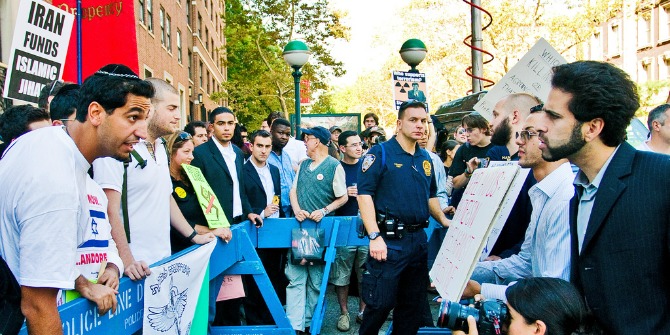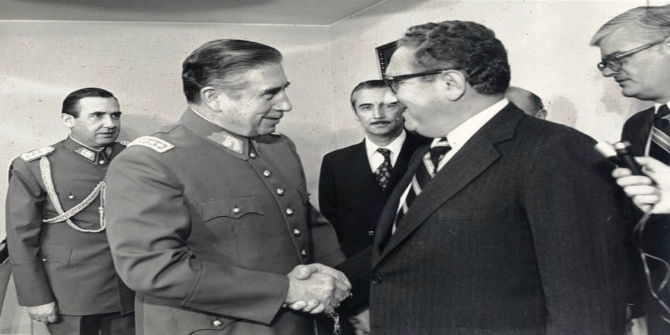 The Arab Spring has boosted both mainstream and radical Islamism, heightened the prospects of a third intifada, and exacerbated regional power rivalry in the Middle East. When adding these dynamics to the stalling Israel-Palestine conflict and ever-tense U.S.-Iran relations, the Middle East faces the prospect of a major implosion or a series of smaller, interconnected ones that could have implications for regional global security, argues Mohammed Ayoob. Magdalena C. Delgado finds this to be an accessible and analytically rich book suitable for general readers looking for an up to date account of the topic.
The Arab Spring has boosted both mainstream and radical Islamism, heightened the prospects of a third intifada, and exacerbated regional power rivalry in the Middle East. When adding these dynamics to the stalling Israel-Palestine conflict and ever-tense U.S.-Iran relations, the Middle East faces the prospect of a major implosion or a series of smaller, interconnected ones that could have implications for regional global security, argues Mohammed Ayoob. Magdalena C. Delgado finds this to be an accessible and analytically rich book suitable for general readers looking for an up to date account of the topic.
 Will the Middle East Implode? Mohammed Ayoob. Polity Press. March 2014.
Will the Middle East Implode? Mohammed Ayoob. Polity Press. March 2014.
Will the Middle East Implode? comprises four substantive chapters, each tackling what Michigan State University Distinguished Professor of International Relations Mohammed Ayoob identifies as sources of potential combustion in the region: the growing role of political Islam; the Israel-Palestine conflict; increased rivalry between regional powers alongside great power involvement in the region; and, Iran’s quest for nuclear capability.
In the opening chapter, Ayoob argues that the Arab Spring has added to existing tensions in the Middle East by introducing a high degree of uncertainty in key areas of regime-nature, intra-societal balances, and inter-state relationships throughout the region. This, he argues, has moved an already volatile Middle East towards not only greater instability but also towards a potentially combustible state of affairs. As such, Ayoob sets the tone for the rest of the book, which is very much marked by a realistic, if pessimistic, take on a post-Arab Spring Middle East in which an implosion capable of engulfing the region and in turn having destabilising effects on the international security and economy is a real prospect.
Ayoob’s chapters “The Islamist Challenge” and “Iran and ‘The Bomb'” are particularly interesting as they offer well-informed takes on two issues that feature heavily in contemporary public debate about the state of affairs in the Middle East.
In the “The Islamist Challenge”, Ayoob shows that the Arab Spring has prompted both mainstream and radical Islamism to play a larger role in regional politics and society. He explains that the electoral successes of Muslim Brotherhood parties in Tunisia and Egypt, which resulted from the Arab Spring, were initially a major boost to mainstream Islamist groups in the intra-Islamist battle. This was the case, especially, in relation to whether Islamist parties could govern without hindrance by external and internal forces in opposition to them, once in power; a possibility that radical and militant Islamists have typically thought implausible. The Egyptian army’s overthrowing of Morsi in July 2013 not only confirmed the suspicion of radical Islamist groups, it also suggested to moderate Islamists that compromise on the part of the Brotherhood will never lead to its acceptance in a leadership position. Such a realisation is likely, Ayoob argues, to push moderate Islamists into the arms of radical Islamist groups who reject democracy and ideological compromises; a development that he deems will not be restricted to Islamists in Egypt, as their counterparts throughout the Middle East will look to Egypt – the cradle of political Islam – and find that the lessons of that country apply to them. That some of these groups should join al Qaeda’s struggle against ‘the far enemy’, is not inconceivable. By taking great care to explicate that Islam’s growing role has heightened prospects of turmoil in the Middle East not because the former necessarily instigates the latter, but because events such as the 2013 Egyptian coup d’etat have fostered resentment to the extent of pushing moderate Islamists into the extremist camps, Ayoob adds nuance to existing debates about the growing role of political Islam in the Middle East, many of which tend to overlook this small, but significant aspect.

In the book’s final substantive chapter, Ayoob turns his attention to Iran’s nuclear aspirations and the key question being debated by Western and Israeli powers, in that context: to bomb Iran or live with the Iranian bomb? Although this issue precedes the Arab Spring, it has only become more pressing as a result of the general straining of tensions in the region. To explain Iran’s nuclear aspirations and demonstrate that the latter are a symptom of a fundamental malaise affecting U.S.-Iranian relations – not its root cause – Ayoob engages in a historically informed analysis. Specifically, he traces U.S.-Iranian relations from the American-instigated overthrow of Mossadegh in 1953, through the hostage crisis in 1979, to more recent examples of U.S.-Iranian cooperation vis-a-vis the ‘War on Terror’ in Afghanistan. Ayoob also examines Iran’s nuclear aspirations in the context of Israel as an existing nuclear power, arguing that the latter – being subject to little international scrutiny – exacerbates Iran’s perception of itself as being unfairly treated by Western powers. Apart from a U.S. and/or Israeli attack being entirely unjustified, as he shows with reference to his historical analysis, Ayoob argues that it would have disastrous implications for the instigators in the form of massive dips in regional public opinion and heightened prospects of violent backlash and regional conflict. Instead, he suggests, efforts should be made to establish a Middle East Nuclear Weapons-Free zone (MENWFZ). In making this suggestion, Ayoob moves away from speculations about Iran’s nuclear intentions and the question of whether to bomb or not, towards a solution that deserves equal if not superior mention to the issues that currently dominate in the debate about Iran.
Ayoob’s take on the destabilising and potentially implosive outcome of the Arab Spring, given the uncertainty that the latter has introduced and added to existing regional issues, is a far cry from existing analyses that celebrate the regional uprisings as heralds of a new democratic era in the Middle East. For that reason, perhaps, Ayoob’s analysis invites the critique of being overly pessimistic in its examination of the region’s current and future state of affairs. Such a critique, I would argue, is entirely unfounded. What Ayoob’s analysis offers is an entirely realistic, if not highly probable, account of the direction in which the Middle East is headed, should the issues of combustion develop according to the plausible trajectories identified in the book. The analysis is made all the more valuable in light of Ayoob’s nuanced understanding of the region’s history and dynamics, in which it is clearly grounded. For these reasons Will the Middle East Implode? should be read by anyone – academic, policy, and general audiences alike – looking to be brought up date about the state of affairs in the Middle East.
—————————————–
Magdalena C. Delgado is a Doctoral candidate and a member of staff in the Department of International Relations at the London School of Economics & Political Science. Her PhD focuses on the role of religion in International Relations, specifically in the contexts of Israeli, Iranian and Saudi Arabian foreign policy. Prior to commencing her Doctoral studies, Magdalena worked for the Royal United Services Institute for Defence and Security Studies and BBC’s World Service Trust. Read more reviews by Magdalena.







